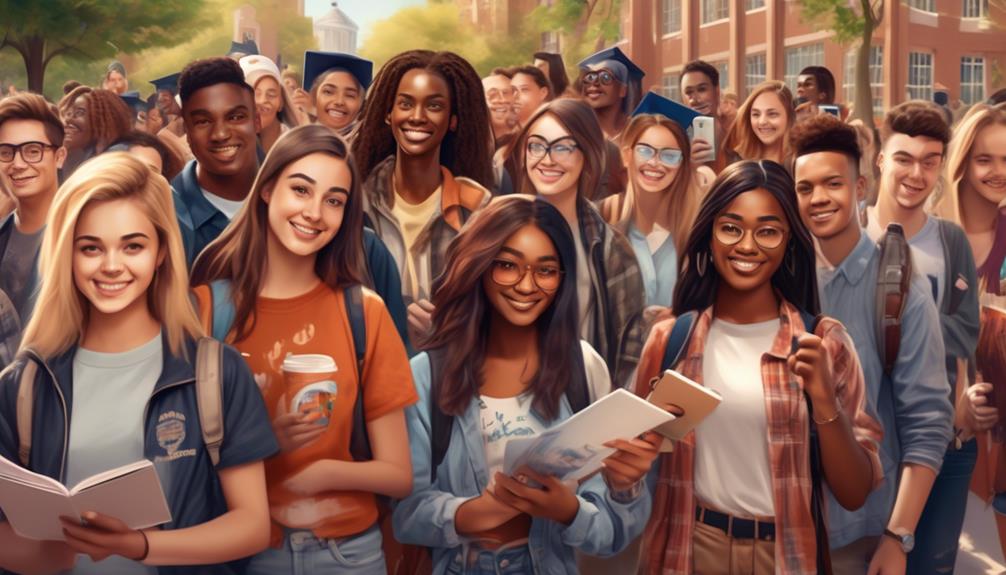In the realm of higher education, leveraging influencer marketing is akin to unlocking a treasure trove of untapped potential. The power of influencers to connect with today's digitally savvy generation of students is undeniable.
But how exactly can this potential be harnessed in a way that aligns with the values and goals of educational institutions? Join us as we explore the nuanced landscape of influencer marketing in higher education, delving into the strategic approaches and real-world examples that can guide institutions toward effective and authentic engagement with their target audience.
Key Takeaways
- Influencer marketing in higher education enhances campus engagement, event attendance, and provides authentic insight and social influence.
- Utilizing automation for personalized communication and implementing social media recruitment best practices are effective strategies for leveraging influencer marketing.
- Case studies and examples demonstrate the widespread use of influencers in UK universities, the cost-effectiveness of micro-influencer marketing, and successful partnerships like Harvard University's collaboration with YouTuber John Fish.
- Leveraging influencer partnerships in higher education increases reach, allows for authentic engagement with students, generates user-generated content, involves alumni to foster a sense of community, and enhances the institution's image and credibility.
Role and Benefits of Influencer Marketing

Leveraging influencer marketing has significantly enhanced our campus engagement and event attendance through the authentic insight and social influence provided by our student ambassadors. In higher education institutions, influencer marketing plays a pivotal role in reaching prospective students and promoting campus life.
By utilizing student ambassadors as influencers, we can create compelling campaigns and engaging content that resonate with Gen Z's demand for authenticity. These influencers have a wide reach and impact among the youth, attracting prospective students to our institution.
The benefits of influencer marketing in higher education are substantial. Student ambassadors can provide authentic insight into student life, which is crucial for resonating with potential students. Their social standing and influence can significantly increase event attendance and campus engagement.
Additionally, successful influencer programs are built on students' positive experiences at the institution, creating a genuine and relatable portrayal of campus life. Overall, influencer marketing in higher education offers a powerful tool for institutions to connect with prospective students and showcase the unique aspects of campus life through the voices of their own students.
Effective Strategies for Leveraging Influencer Marketing
As we explore effective strategies for influencer marketing, our focus shifts to optimizing the impact of authentic insights and social influence provided by student ambassadors in higher education. Leveraging influencer marketing in higher education involves implementing key strategies to maximize the benefits.
Here are some effective strategies to consider:
- Authenticity and Engagement: Encourage student ambassadors to share genuine experiences and insights, resonating with the authenticity Gen Z seeks and driving increased engagement on campus.
- Alumni Involvement and Increased Reach: Engage alumni and current students as influencers to build a strong community, attract prospective students, and extend the reach of influencer impact.
- Personalization and Efficiency: Utilize automation for personalized communication, reducing manual work, and enhancing efficiency in recruitment and enrollment processes.
- Social Media Recruitment Best Practices: Define the target audience, create engaging content, collaborate with influencers, use targeted advertising, and continuously analyze data for successful social media recruitment.
Case Studies and Examples of Influencer Marketing in Higher Education

Engaging case studies and examples illustrate the impactful outcomes of influencer marketing in higher education, shedding light on successful strategies and their far-reaching effects. Many institutions have successfully leveraged influencers in their marketing campaigns.
For instance, two-thirds of UK universities use influencers to reach potential students, effectively building relationships and attracting applicants. Micro-influencer marketing in higher education has also proven to be cost-effective, leading to increased enrollment rates and higher engagement.
Harvard University's partnership with YouTuber John Fish resulted in millions of views, offering a firsthand student experience to a global audience. This showcases the potential of influencer partnerships in higher education.
Additionally, leveraging influencers for recruitment and fundraising is crucial, as it can lead to successful fundraising campaigns and foster a connectedness among alumni. UCLA's approach of highlighting academic expertise effectively attracts prospective students and enhances the institution's reputation.
These case studies demonstrate the diverse and impactful ways in which influencer marketing is being utilized in higher education marketing.
Leveraging Influencer Partnerships for Higher Education
Our university has found that forming authentic partnerships with influencers provides invaluable insights into student life, resonating with Gen Z's demand for authenticity. Leveraging influencer partnerships for higher education institutions can be a game-changer in reaching prospective students and engaging the target audience.
Here are four key ways influencer partnerships can benefit higher education institutions:
- Increased Reach: Influencers can significantly expand the reach of higher education institutions, promoting their programs to a wider audience.
- Authentic Engagement: Partnering with influencers allows institutions to engage students in a more authentic and relatable manner, strengthening the overall marketing strategy.
- User-Generated Content: Influencer partnerships can generate user-generated content that showcases the positive experiences of students, enhancing the institution's image and credibility.
- Alumni Involvement: Involving alumni in influencer partnerships can foster a sense of community, aid in fundraising efforts, and provide valuable insights into the student experience.
Finding and Working With Influencers in Higher Education

To successfully find and work with influencers in higher education, we actively seek individuals who authentically resonate with student life and align with our institution's values. Identifying influencers who offer genuine insight into student life is crucial to reaching prospective students, especially Gen Z, who demand authenticity.
Collaborating with influencers who embody our institution's values and culture ensures that our messaging remains consistent and resonates with our target audience. Leveraging student and alumni ambassadors can also be beneficial, not only to increase event attendance but also to foster a sense of community among graduates.
When working with influencers, we prioritize content ideas that showcase student life and provide valuable information for prospective and current students. Additionally, it's essential to monitor and analyze the performance of influencer campaigns to optimize our strategies continually.
Frequently Asked Questions
How Do You Leverage Influencer Marketing?
We leverage influencer marketing by strategically partnering with individuals who authentically connect with our audience. We maximize their impact through collaborative campaigns, tapping into their social influence to drive engagement and foster a sense of community.
How Influencers Are Used as a Marketing Strategy?
Influencers are used as a marketing strategy to authentically connect with audiences, building trust and loyalty. They amplify our message, reaching and engaging with a wide audience, influencing their decisions and driving action.
What Are the Educational Requirements to Become an Influencer Marketer?
We need at least a bachelor's degree in marketing, communications, or related fields, and advanced positions may require a master's degree in marketing or business administration. Specialized courses in social media marketing and strong writing skills are also beneficial.
How Do You Use Influencer Marketing Effectively?
We use influencer marketing effectively by collaborating with influencers aligned with our values, defining clear campaign objectives, and utilizing student and alumni influencers for authentic perspectives. Establishing long-term relationships and monitoring campaigns regularly optimize our strategies.
Conclusion
In conclusion, leveraging influencer marketing in higher education can be a game-changer.
Did you know that 71% of marketers believe that influencer marketing helps in building brand awareness?
By partnering with the right influencers, institutions can connect with prospective students and alumni in an authentic and engaging way, ultimately enhancing their campus community and fundraising efforts.
It's a powerful tool that shouldn't be overlooked in the higher education space.
